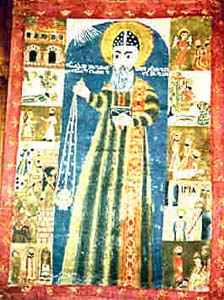St. Ephrem the Syrian: Meditate on the Passion of Christ
Every year around this time, someone opines that meditation on the death of Christ is vile, heterodox, post-Schism, a macabre obsession with "gore." They take particular offense at the Stations of the Cross, although they seem to regard any consideration of Our Lord's suffering as part of the non-Orthodox approach to Christianity. As with so much of their railing approach to theology, though, this assertion contrasts sharply with the approach taken by many Orthodox saints. This homily by St. Ephrem the Syrian is particularly illustrative of the patristic exhortation to meditate on the Passion of Christ (especially during penitential seasons):
The sons of perdition and the children of darkness
went out in the darkness
to arrest the sun
who had the power to consume them in an instant.But the Master, knowing their effrontery
and the force of their anger,
with gentleness, by his own authority,
gave himself up into the hands of the ungodly.And lawless men, having bound the most pure Master,
mocked the one who had bound the strong one with unbreakable bonds,
and set us free from the bonds of sins.They plaited a crown of their own thorns,
the fruit borne by the vine of the Jews.In mockery they called him ‘King’.
See, once again grief and tears grip hold of my heart,
The lawless spat in the face of the most pure,
at whose glance all the Powers of heaven
and the ranks of Angels quake with fear.
as I contemplate the Master enduring outrage and insults,
scourgings, spitting from slaves, and blows...
Let us fear, my brethren
and not simply listen.
The Saviour endured all these things for us...You that are longed for and loved by Christ,
draw near, with compunction and longing for the Saviour.Come, let us learn what took place today in Sion, David’s city.
The longed-for and chosen offspring of Abraham, what did they do today?
They gave up to death the most pure Master on this day.
Christ our Saviour was unjustly hanged on the tree of the Cross
through lawless hands.Come, let us all wash our bodies with tears and groans,
because our Lord, the King of glory, for us ungodly people
was given up to death...Let us always be fearful,
keeping before our eyes
the Saviour’s sufferings.Let us always keep in mind his sufferings,
because it was for us he suffered, the dispassionate Master;
for us he was crucified, the only sinless One.What return can we make for all this, brethren?
Let us be attentive to ourselves and not despise his sufferings.
Draw near all of you, children of the Church,
bought with the precious and holy blood of the most pure Master.Come, let us meditate on his sufferings with tears,
thinking on fear, meditating with trembling,
saying to ourselves,
‘Christ our Saviour for us the impious was given over to death’.Learn well, brother, what it is you hear:
God who is without sin, Son of the Most High,
for you was given up.Open your heart, learn in details His sufferings and say to yourself:
God who is without sin
today was given up,
today was mocked,
today was abused,
today was struck,
today was scourged,
today wore a crown of thorns,
today was crucified,
he, the heavenly Lamb.
Your heart will tremble, your soul will shudder.
Shed tears everyday by this meditation on the Master's sufferings.
Tears become sweet (for) the soul is enlightened that always meditates on Christ's sufferings.Always meditating thus, shedding tears every day,
giving thanks to the Master for the sufferings that he suffered for you,
so that in the day of his Coming your tears may become your boast and exaltation before the judgment seat.Endure as you meditate on the loving Master’s sufferings,
endure temptations, give thanks from your soul.Blessed is the one who has before his eyes
the heavenly Master and his sufferings,
and has crucified himself from all the passions
and earthly deeds,
who has become an imitator
of his own Master.This is understanding,
this is the attitude
of servants who love God,
when they become ever
imitators of their Master
by good works.Shameless man, do you watch
the most pure Master
hanging on the Cross,
while you pass the time
that you have to live on earth
in pleasure and laughter?Don’t you know, miserable wretch,
that the crucified Lord
will demand an account
of all your disdainful deeds,
for which, when you hear of them, you show no concern,
and as you take your pleasure
you laugh
and enjoy yourself with indifference?The day will come,
that fearful day,
for you to weep unceasingly
and cry out in the fire
from your pains,
and there will be no one at all
to answer
and have mercy on your soul.
Read it all here.
(Wow, even "Archbishop Gregory" of Buena Vista knows about this text.)
Labels: devotions, Orthodox doctrine, saints

